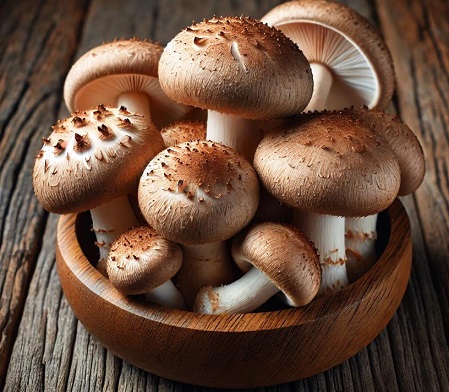Shictin, a novel lectin from Shiitake mushrooms, shows promise in combating COVID-19 Omicron variant
Nikhil Prasad Fact checked by:Thailand Medical News Team Aug 06, 2024 1 year, 5 months, 2 days, 7 hours, 41 minutes ago
COVID-19 News: A groundbreaking study has uncovered a potential antiviral agent from a surprising source: shiitake mushrooms. This
COVID-19 News report delves into the discovery of a novel lectin, named Shictin, derived from vesicle-like nanoparticles (VLNs) of shiitake mushrooms, which exhibits potent activity against the SARS-CoV-2 Omicron variant. Researchers from various esteemed institutions including the Nebraska Center for Virology-USA, the University of Nebraska-Lincoln-USA, and the University of Southern Mississippi-USA collaborated on this fascinating study.
 Shictin, a novel lectin from Shiitake mushrooms, shows promise in combating COVID-19 Omicron variant
Shictin, a novel lectin from Shiitake mushrooms, shows promise in combating COVID-19 Omicron variant
Image - AI generated by TMN
The Power of Lectins
Lectins are a type of carbohydrate-binding protein known for their ability to inhibit viral infections by binding to glycans on the virus surface, thus preventing viral entry into host cells. Shictin, the newly identified lectin, contains 298 amino acids and has two unique domains: an N-terminal carbohydrate-binding domain (CBD) and a C-terminal domain. The study findings highlight how Shictin's structure is similar to other known lectins, suggesting its mechanism of inhibiting SARS-CoV-2 by targeting the glycans on the virus.
Screening Vegetable Nanoparticles
The researchers conducted a comprehensive screening of VLNs from fifteen different vegetables and mushrooms for antiviral properties. They found that VLNs from shiitake mushrooms, white button mushrooms, scallions, chives, garlic, and leeks exhibited significant antiviral activities against various SARS-CoV-2 variants. Notably, the shiitake mushroom VLNs showed the most promising results, especially against the Omicron variant, with an effective concentration (EC50) of 5.2x108/ml.
Detailed Study on Shiitake VLNs
Further analysis revealed that the protein components within the shiitake VLNs were crucial for their antiviral activity. The researchers subjected the VLNs to sonication and heat treatment to understand the role of these proteins. While sonication did not alter the antiviral properties, heat treatment significantly reduced the antiviral activity, indicating the importance of the protein components.
Shictin: The Key Antiviral Agent
Proteomic analysis of the shiitake VLNs identified a lectin-like protein, which was named Shictin. Detailed structural and functional analysis showed that Shictin is a calcium-dependent sugar-binding lectin, closely related to other known lectins with antiviral properties. Shictin's carbohydrate-binding domain was found to be crucial for its antiviral function.
Antiviral Efficacy of Shictin
Purified Shictin was tested against three pseudotyped SARS-CoV-2 variants: Ancestral, Delta, and Omicron. The results were remarkable, with Shictin demonstrating potent activity against the Omicron variant, having an inhibitory concentration (IC50) of 319nM. Further tests against infectious vir
us strains confirmed these findings, showing even greater potency with an IC50 value of 87.24nM for the Omicron variant.
Thailand Medical News would like to add that all the SARS-CoV-2 sub-lineages that are behind the current COVID-19 surges i.e. the KP variants, are all descendants of the Omicron variant and hence there is high probability that Shictin would perform just as well in terms as an antiviral agent.
Discussion: Implications and Future Prospects
This discovery has significant implications for the development of new antiviral therapies. The study demonstrates that vegetable-derived VLNs can be a valuable source of antiviral agents like Shictin. The increased efficacy of Shictin against the Omicron variant suggests that it could be particularly useful in combating this and potentially other variants of SARS-CoV-2.
The study also underscores the importance of understanding viral glycosylation patterns and how they evolve, as these patterns play a critical role in the virus's ability to infect and evade the immune system. The differences in glycosylation among the SARS-CoV-2 variants could explain the varying levels of inhibition observed with Shictin.
Conclusion
The identification of Shictin from shiitake mushroom-derived nanoparticles marks a promising step forward in the search for effective treatments against COVID-19. This novel lectin shows strong potential as a therapeutic agent, particularly against the Omicron variant. The findings of this study highlight the untapped potential of natural sources in antiviral research and open up new avenues for the development of broad-spectrum antiviral therapies.
The study findings were published on a preprint server and are currently being peer reviewed.
https://papers.ssrn.com/sol3/papers.cfm?abstract_id=4884731
For the latest
COVID-19 News, keep on logging to
Thailand Medical News.
Read Also:
https://www.thailandmedical.news/news/plant-alkaloids-show-promise-against-covid-19
https://www.thailandmedical.news/news/terpenes-from-plants-belonging-to-the-fabaceae-family-show-potential-to-treat-covid-19
